Complementary Exercises of Unit 7,Book3
- 格式:doc
- 大小:56.00 KB
- 文档页数:5
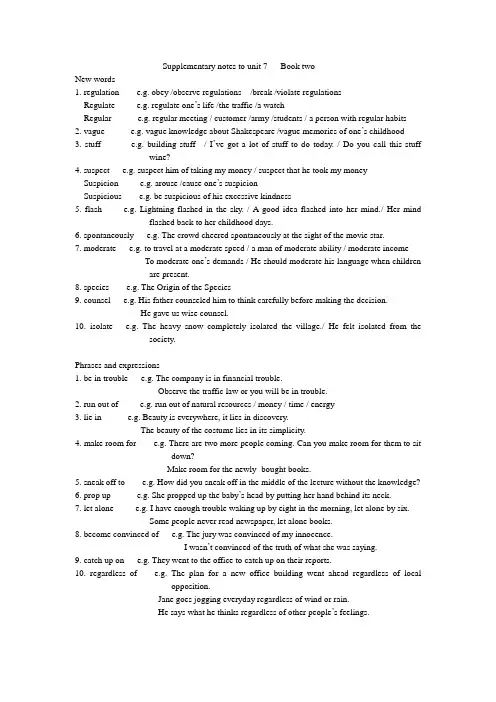
Supplementary notes to unit 7 Book twoNew words1. regulation e.g. obey /observe regulations /break /violate regulationsRegulate e.g. regulate one’s life /the traffic /a watchRegular e.g. regular meeting / customer /army /students / a person with regular habits2. vague e.g. vague knowledge about Shakespeare /vague memories of one’s childhood3. stuff e.g. building stuff / I’ve got a lot of stuff to do today. / Do you call this stuffwine?4. suspect e.g. suspect him of taking my money / suspect that he took my moneySuspicion e.g. arouse /cause one’s suspicionSuspicious e.g. be suspicious of his excessive kindness5. flash e.g. Lightning flashed in the sky. / A good idea flashed into her mind./ Her mindflashed back to her childhood days.6. spontaneously e.g. The crowd cheered spontaneously at the sight of the movie star.7. moderate e.g. to travel at a moderate speed / a man of moderate ability / moderate incomeTo moderate one’s demands / He should moderate his language when childrenare present.8. species e.g. The Origin of the Species9. counsel e.g. His father counseled him to think carefully before making the decision.He gave us wise counsel.10. isolate e.g. The heavy snow completely isolated the village./ He felt isolated from thesociety.Phrases and expressions1. be in trouble e.g. The company is in financial trouble.Observe the traffic law or you will be in trouble.2. run out of e.g. run out of natural resources / money / time / energy3. lie in e.g. Beauty is everywhere, it lies in discovery.The beauty of the costume lies in its simplicity.4. make room for e.g. There are two more people coming. Can you make room for them to sitdown?Make room for the newly- bought books.5. sneak off to e.g. How did you sneak off in the middle of the lecture without the knowledge?6. prop up e.g. She propped up the baby’s head by putting her hand behind its neck.7. let alone e.g. I have enough trouble waking up by eight in the morning, let alone by six.Some people never read newspaper, let alone books.8. become convinced of e.g. The jury was convinced of my innocence.I wasn’t convinced of the truth of what she was saying.9. catch up on e.g. They went to the office to catch up on their reports.10. regardless of e.g. The plan for a new office building went ahead regardless of localopposition.Jane goes jogging everyday regardless of wind or rain.He says what he thinks regardless of other people’s feelings.。
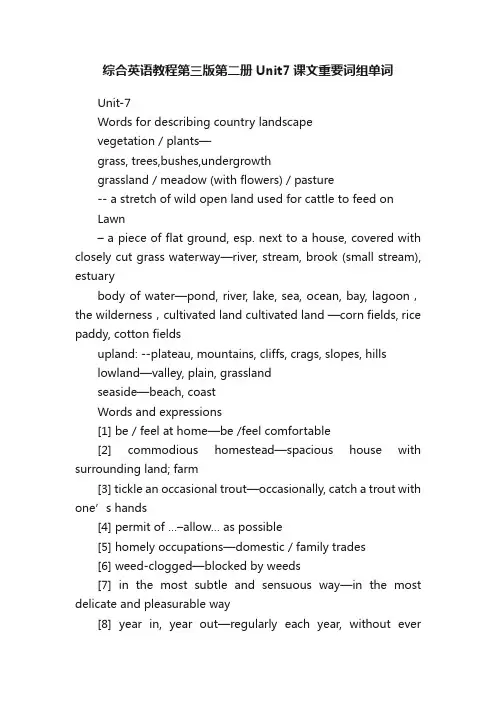
综合英语教程第三版第二册Unit7课文重要词组单词Unit-7Words for describing country landscapevegetation / plants—grass, trees,bushes,undergrowthgrassland / meadow (with flowers) / pasture-- a stretch of wild open land used for cattle to feed onLawn– a piece of flat ground, esp. next to a house, covered with closely cut grass waterway—river, stream, brook (small stream), estuarybody of water—pond, river, lake, sea, ocean, bay, lagoon,the wilderness,cultivated land cultivated land —corn fields, rice paddy, cotton fieldsupland: --plateau, mountains, cliffs, crags, slopes, hillslowland—valley, plain, grasslandseaside—beach, coastWords and expressions[1] be / feel at home—be /feel comfortable[2] commodious homestead—spacious house with surrounding land; farm[3] tickle an occasional trout—occasionally, catch a trout with one’s hands[4] permit of …–allow… as possible[5] homely occupations—domestic / family trades[6] weed-clogged—blocked by weeds[7] in the most subtle and sensuous way—in the most delicate and pleasurable way[8] year in, year out—regularly each year, without everchanging[9] haunt n. a place one often visitsif only:1)used to express a wish with reference to present or future time;2)2) used to express a wish that past events had been differente.g.1.If only I were rich. 但愿我很富有。
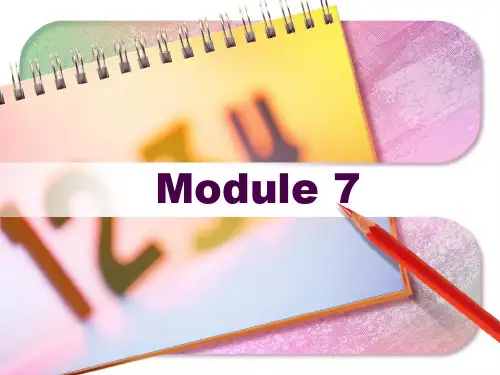
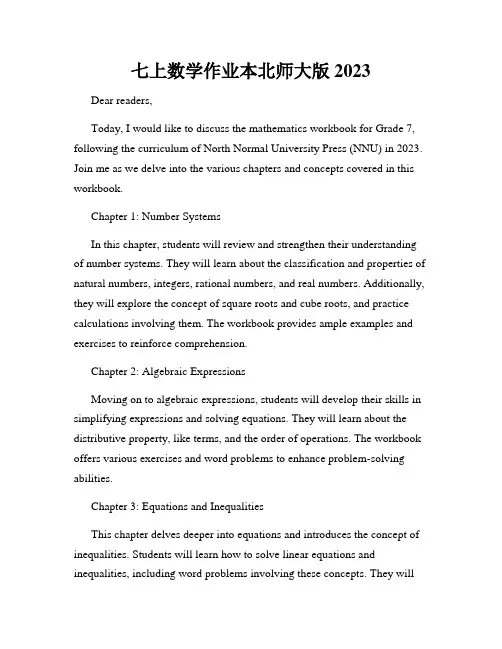
七上数学作业本北师大版2023Dear readers,Today, I would like to discuss the mathematics workbook for Grade 7, following the curriculum of North Normal University Press (NNU) in 2023. Join me as we delve into the various chapters and concepts covered in this workbook.Chapter 1: Number SystemsIn this chapter, students will review and strengthen their understanding of number systems. They will learn about the classification and properties of natural numbers, integers, rational numbers, and real numbers. Additionally, they will explore the concept of square roots and cube roots, and practice calculations involving them. The workbook provides ample examples and exercises to reinforce comprehension.Chapter 2: Algebraic ExpressionsMoving on to algebraic expressions, students will develop their skills in simplifying expressions and solving equations. They will learn about the distributive property, like terms, and the order of operations. The workbook offers various exercises and word problems to enhance problem-solving abilities.Chapter 3: Equations and InequalitiesThis chapter delves deeper into equations and introduces the concept of inequalities. Students will learn how to solve linear equations and inequalities, including word problems involving these concepts. They willalso explore the graphical representation of linear inequalities on a coordinate plane. The workbook provides step-by-step explanations and exercises to solidify understanding.Chapter 4: Ratios, Proportions, and RatesThe fourth chapter focuses on ratios, proportions, and rates, which are fundamental concepts in mathematics. Students will learn how to find equivalent ratios, solve proportion problems, and calculate rates. They will also apply these skills to real-life situations, such as scaling and map reading. The workbook contains engaging activities to enable practical application of these concepts.Chapter 5: Percentages and Simple InterestIn this chapter, students will explore percentages and their applicationsin real-life scenarios. They will learn how to convert between fractions, decimals, and percentages. Furthermore, they will solve problems related to simple interest, understanding the concept of interest rates and its relation to percentages. The workbook includes diverse examples and exercises to hone these skills.Chapter 6: Polygons and AnglesChapter six is dedicated to the study of polygons and angles. Students will learn the properties and classifications of polygons, including triangles and quadrilaterals. They will also delve into the measurement of angles, exploring concepts such as complementary and supplementary angles. The workbook offers practical exercises to deepen their understanding of these geometric concepts.Chapter 7: Surface Area and VolumeIn this chapter, students will immerse themselves in the world of three-dimensional shapes. They will learn how to calculate the surface area and volume of various solids, including cubes, cylinders, and prisms. The workbook provides step-by-step instructions and examples to help students master these calculations.Chapter 8: Data and ProbabilityThe final chapter introduces students to fundamental concepts of statistics and probability. They will learn how to collect, organize, and interpret data using bar graphs, line graphs, and pie charts. Students will also explore probability through experiments and calculations. The workbook presents real-world scenarios and exercises to enhance data analysis skills.In conclusion, the Grade 7 mathematics workbook, published by North Normal University Press in 2023, encompasses a wide range of topics to build a strong foundation in mathematics. With its comprehensive explanations, examples, and exercises, students are provided with the necessary tools to develop problem-solving and analytical skills. By actively engaging with the workbook, students will undoubtedly excel in their mathematical journey.Thank you for joining me in this exploration of the Grade 7 mathematics workbook. I hope it serves as a valuable resource to support your mathematics learning.。
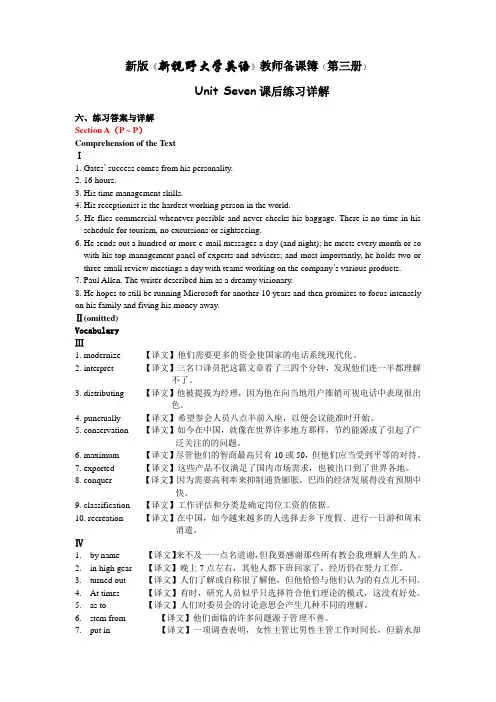
新版《新视野大学英语》教师备课簿(第三册)Unit Seven课后练习详解六、练习答案与详解Section A(P ~ P)Comprehension of the TextⅠ1. Gates’ success comes from his personality.2. 16 hours.3. His time management skills.4. His receptionist is the hardest working person in the world.5. He flies commercial whenever possible and never checks his baggage. There is no time in his schedule for tourism, no excursions or sightseeing.6. He sends out a hundred or more e-mail messages a day (and night); he meets every month or so with his top management panel of experts and advisers; and most importantly, he holds two or three small review meetings a day with teams working on the company’s various products.7. Paul Allen. The writer described him as a dreamy visionary.8. He hopes to still be running Microsoft for another 10 years and then promises to focus intensely on his family and fiving his money away.Ⅱ(omitted)VocabularyⅢ1. modernize 【译文】他们需要更多的资金使国家的电话系统现代化。
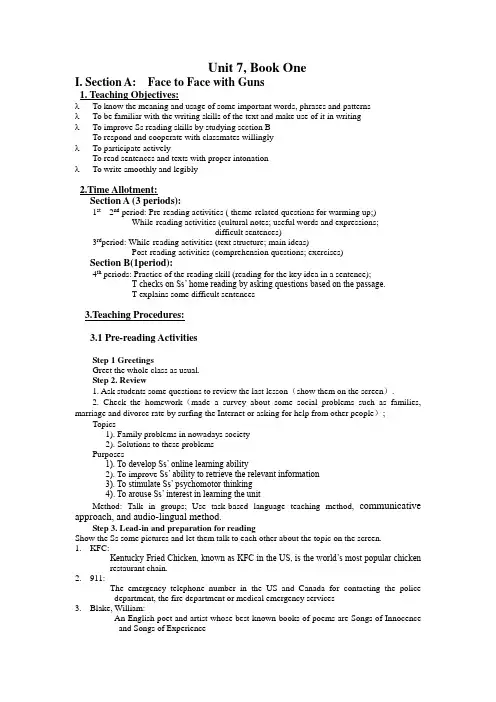
Unit 7, Book OneI. Section A: Face to Face with Guns1. Teaching Objectives:λTo know the meaning and usage of some important words, phrases and patternsλTo be familiar with the writing skills of the text and make use of it in writingλTo improve Ss reading skills by studying section BTo respond and cooperate with classmates willinglyλTo participate activelyTo read sentences and texts with proper intonationλTo write smoothly and legibly2.Time Allotment:Section A (3 periods):1st---2nd period: Pre-reading activities ( theme-related questions for warming up;)While-reading activities (cultural notes; useful words and expressions;difficult sentences)3rd period: While-reading activities (text structure; main ideas)Post-reading activities (comprehension questions; exercises)Section B(1period):4th periods: Practice of the reading skill (reading for the key idea in a sentence);T checks on Ss’ home reading by asking questions based on the passage.T explains some difficult sentences3.Teaching Procedures:3.1 Pre-reading ActivitiesStep 1 GreetingsGreet the whole class as usual.Step 2. Review1. Ask students some questions to review the last lesson(show them on the screen).2. Check the homework(made a survey about some social problems such as families, marriage and divorce rate by surfing the Internet or asking for help from other people);Topics1). Family problems in nowadays society2). Solutions to these problemsPurposes1). To develop Ss’ online learning ability2). To improve Ss’ ability to retrieve the relevant information3). To stimulate Ss’ psychomotor thinking4). To arouse Ss’ interest in learning the unitMethod: Talk in groups; Use task-based language teaching method, communicative approach, and audio-lingual method.Step 3. Lead-in and preparation for readingShow the Ss some pictures and let them talk to each other about the topic on the screen.1.KFC:Kentucky Fried Chicken, known as KFC in the US, is the world’s most popular chickenrestaurant chain.2.911:The emergency telephone number in the US and Canada for contacting the policedepartment, the fire department or medical emergency services3.Blake, William:An English poet and artist whose best-known books of poems are Songs of Innocenceand Songs of Experience4.The Thames:The main river flowing through London, and England’s most important river Method: Use the CAI, PPT software and talk in groups; Use task-based language teaching method, communicative approach, audio-visual method and audio-lingual method.Step 4. Fast readingAsk the Ss to read the passage as quickly as they can and to answer the questions on the screen. Let them get the main idea of each paragraph and make clear about the text structure.Text structure: ( structured writing )Purpose: Improve the students’ reading and writing ability and understand the general idea of each paragraph.Method: Read the text individually and talk in groups; Use task-based language teaching method, reading approach, communicative approach and total physical responseStep 5. Preparation for details of the text on the screenSs are required to look at the words and Phrases on the screen and give a brief presentation in class.Words and Phrases:Purpose:Train the Ss’ ability of understandi ng and using foreign language.Method: Talk in groups, Use task-based language teaching method, communicative approach and total physical response method.Shrub / bush / woods / jungle / forest小树林/灌木丛/树林/丛林/森林Pistol / rifle / revolver手枪/来复枪/左轮手枪Wallet / purse男士钱包/女士钱包Trousers / pants / jeans裤子/便裤/牛仔裤Sideway / sidewalk放到一边/人行道Found: set up; establish建立Face to face: encounter;偶遇Rather than: instead of而不是…Get to one’s feet: stand up; rise站起来Look through: look over查阅1)exception: a person or thing that is not includedYou must answer all the questions without exception. 所有的问题你都要回答,不能有例外。
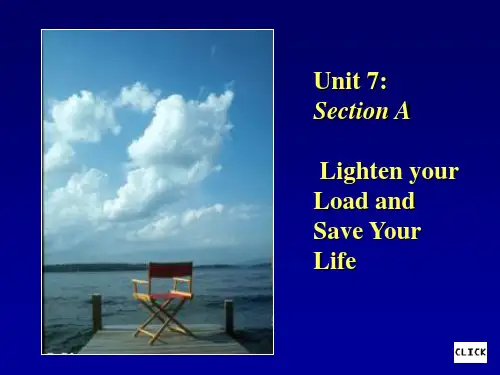

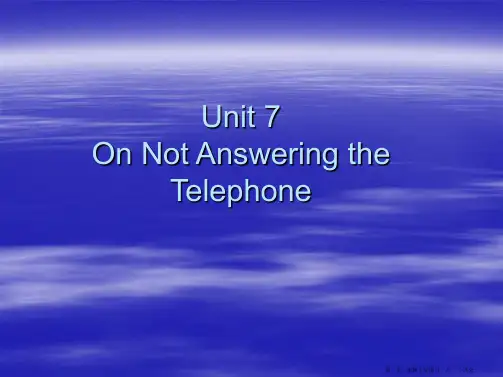
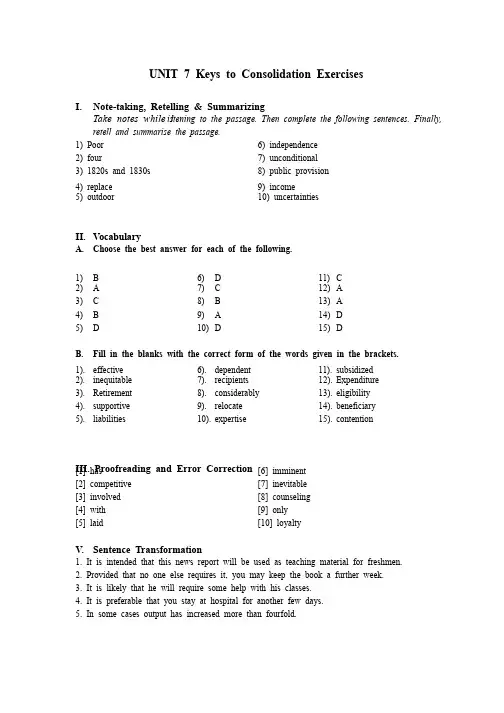
UNIT 7 Keys to Consolidation Exercises I. Note-taking, Retelling & Summarizing Take notes while l istening to the passage. Then complete the following sentences. Finally, retell and summarise the passage. 1) Poor 2) four 3) 1820s and 1830s 4) replace 5) outdoor 6) independence 7) unconditional 8) public provision 9) income 10) uncertainties II. Vocabulary A. Choose the best answer for each of the following. 1)B 2)A 3)C 4)B 5)D 6)D 7)C 8)B 9)A 10)D 11)C 12)A 13)A 14)D 15)D B. Fill in the blanks with the correct form of the words given in the brackets.1).effective 2).inequitable 3).Retirement 4).supportive 5).liabilities 6).dependent 7).recipients 8).considerably 9).relocate 10).expertise 11).subsidized 12).Expenditure 13).eligibility 14).beneficiary 15).contention III. Proofreading and Error Correction [1] has [2] competitive [3] involved [4] with [5] laid [6] imminent [7] inevitable [8] counseling [9] only [10] loyalty V. Sentence Transformation 1. It is intended that this news report will be used as teaching material for freshmen. 2. Provided that no one else requires it, you may keep the book a further week. 3. It is likely that he will require some help with his classes. 4. It is preferable that you stay at hospital for another few days. 5. In some cases output has increased more than fourfold. VI. Translation1. 在您工作时缴纳的社会安全税,85%进入支付月福利给退休人士与其家人,进入支付月福利给退休人士与其家人,以及支付月以及支付月福利给已故工作者生存的配偶与子女的信托基金。

Unit 7I课文填空I was in the tiny bathroom in the back of the plane when I felt the __________ ___________, and then the horrible__________ that threw me against the door.The flight attendants, already _________ in, waved wildly for me to sit down. As I _________ toward my seat, passengers looked up at me with the _________expressions of creatures who know they are about to die.“I think we got hit by ________,” the girl in the seat next to mine said. She was from a small town in east Texas, and this was only her second time on an airplane.The pilot’s voice came over the speaker. I heard ________ through my fear, “Engine number two ... emergency landing ... New Orleans.”When he was done, the voice of a flight attendant came on, ________ us of the emergency ________ she had reviewed before takeoff.Of course I never paid attention to this drill, always figuring that if we ever got to the point where we needed to use __________ __________, I would have already died of __________.I was ready to _________, but when I saw the face of the girl next to me, I pulled myself together, I reached for her hand and _________ her that we were going to make it.Someone was comforting me — a _________ young woman across the aisle, the female _________ of the confident businessman. She must have seen how _________ I was and reached over.There was someone I wanted to call. Back in Vermont, my husband, Bill, was __________ my arrival late that night.When my name was finally called to _________my new flight, I felt almost_________ to be parting from the people whose lives had so__________, if briefly, touched mine.I am __________ to my fellow passengers and wish I could pay them back.“I tell you,” she _________, “the problems I brought up on this plane with me sure don’t seem real big right now.” I loved her Southern drawl, her __________ use of perfume, and her ________ squeezes.Among the many feelings going through my head during those_________20 minutes was pride —pride in how well everybody on board was behaving. No one ________. No one ________. Outside on the ground, attendants and officials were waiting to________us to _______ flights. But we passengers _________ together.答案见课本原文2扩展题:用课文中学过的词填空The minibus to the right, bumped a tree, and fell into a ditch.She at me with a knife.On the misty hillside, we could see some sheep coming through the mist.So much time was spent establishing the at our first meeting that we did not start any actual business until our second.Whenever you go swimming, you should wear .He was able to in the face of danger and hardship.Changing his job like that is to giving him the sack.He came and to me that he had spent five years in prison.We do not like her application of cosmetics.Her use of money is in sharp contrast to her husband’s economical use of his income. The statue was carved with precision.of opposition to the new regime still remained.They to one another for comfort.She is always the lack of sports facilities in town.We great pleasure from our visit to London.The commander made a decision to counter-attack.KeyThe minibus swerved to the right, bumped a tree, and fell into a ditch.She lunged at me with a knife.On the misty hillside, we could see vaguely some sheep coming through the mist.So much time was spent establishing the procedure at our first meeting that we did not start any actual business until our second.Whenever you go swimming, you should wear life jackets.He was able to pull himself together in the face of danger and hardship.Changing his job like that is equivalent to giving him the sack.He came and confided to me that he had spent five years in prison.We do not like her indiscriminate application of cosmetics.Her indiscriminate use of money is in sharp contrast to her husband’s economical use of his income.The statue was carved with excruciating precision.Pockets of opposition to the new regime still remained.They clung to one another for comfort.She is always lamenting the lack of sports facilities in town.We anticipate great pleasure from our visit to London.The commander made a fateful decision to counter-attack.。
Complementary Exercises of Unit 7,Book3I. Information matchingA)LOS ANGELES—Fans rushed to see 3-D movies such as Cloudy with a Chance of Meatballsin theaters this year and new 3-D televisions could soon have home viewers feeling as if they're surrounded by a noodle storm on their couches. Next year, major electronics manufacturers Sony Corp. and Panasonic Corp. plan to introduce 3-D-capable high-definition televisions for the mass market. You'll still need to wear special glasses, though.B)Movie studios hope 3-D can help lift the weak home video market the same way it has pushedup box office results. The initial price of such sets is expected to be high—perhaps 20 percent more than normal sets of the same size. But costs should come down in the coming years.Depending on prices, 3-D-ready TVs could be in 28 million to 46 million homes worldwide by 2013, predicts Alfred Poor, an analyst with GigaOM Pro. He estimates that next year, as many as 2.5 million sets worldwide will be sold with 3-D capability. "We're raising a whole generation of kids who expect to see this effect for their movies at home," Poor said. "I think people want 3-D. I just don't think they're going to want to pay a whole lot more for it." To avoid the need for special screens, some manufacturers of TV sets are being away from the 3-D technology common in theaters in favor of what's known as "active avoidance". That uses an infra-red (红外线的) emitter on the TV to tell battery-powered glasses when to adjust the left and right lenses in conjunction with the images on the screen, which gives the perception of three dimensions. The sets themselves will require relatively minor upgrades from today's models, but the glasses will cost more, raising the price of the overall package.C)There's no question 3-D movies are popular. They generated more than $1 billion at boxoffices worldwide this year, and on a per-screen basis, 3-D showings typically bring in more than double the revenue of regular screenings when a movie is offered in both versions. For hits like Disney/Pixar's Up and 20th Century Fox's Ice Age: Dawn of the Dinosaurs, more than half of ticket revenues came from 3-D screens, despite accounting for far fewer showings, according to the research firm Screen Digest. Those screenings tend to fill up, and moviegoers are willing to pay a few dollars extra per ticket.D)Making these 3-D movies hasn't been cheap, and so far there hasn't been an adequate way togive back those higher costs in the home video market, which brings in far more dollars to studios than the theatrical release. In September, DreamWorks Animation SKG Inc. released a two-disc pack of Monsters vs. Aliens with just a 3-D bonus vignette (花絮) accompanying a 2-D version of the movie. It comes with cardboard glasses with dark reddish purple and green lenses that create a 3-D effect. The so-called "anaglyph (立体影片)" technology is out of date and can change colors but works with regular TVs.E)"We think for 10 minutes or so, it's a fun experience, but it's not a great experience for anhour-and-a-half or two-hour-long movie," said John Batter, DreamWorks' co-president of production for feature animation (动画片). The studio is considering a re-release of the movieat higher prices using modern 3-D technology, followed by future releases after 3-D TVs become available next year. Batter said 3-D releases "will certainly grow over time and it will become, I think, a significant part of our home video business in a three- to five-year cycle".F)Meanwhile, Universal Studios Home Entertainment released the stop-motion animated movieCoraline in July both in 2-D and 3-D with the cardboard glasses, but director Henry Selick said he was disappointed with the result. "I wish they'd waited to do the home 3-D release until the technology caught up to what it was in the theaters," Selick told a conference last month. "I'm disappointed in how few people got to see it in the best possible way."G)As more living rooms are equipped for movies in 3-D, studios will have stronger motivationto release them for home viewing especially as 3-D movies are expected to spend less time in theaters. With about 30 3-D movies headed for theaters next year and only enough screens to show one major picture at a time, the average theatrical run will shrink to less than two weeks in 2010, down from nearly nine weeks in 2008, according to Charlotte Jones, a senior analyst with Screen Digest.H)That could put more emphasis on making up for filmmaking costs on the home market, shesaid. But the home market is also coming under pressure. US home video revenues in the first half of 2009 fell 3.9 percent from a year ago to $9.4 billion. Tom Adams, president of Adams Media Research, said 3-D videos could be the good news in the industry needs, especially because it will take a lot longer for 3-D TV signals to reach people's homes by cable or broadcast. "Among the early adopting crowd, they're going to go out and buy practically everything that comes out," Adams said. "It could be pretty profitable for studios even if it's fairly small in terms of the number of households."I)Cable networks are experimenting with 3-D, too. Last month, ESPN hosted test screenings ofa USC-Ohio State football game in four US cities, following similar events put on bytechnology provider 3ality Digital LLC.J)Many technology companies are banking on a 3-D-at-home boom. RealD, the leading provider of 3-D systems in theaters, is preparing to expand production of "active shutter (快门)" eyewear. Sony Corp. has plans for a range of new 3-D products, from TVs to PlayStation games. Meanwhile, Sony Pictures Animation's latest 3-D feature, Cloudy with a Chance of Meatballs, was an unexpected box office hit, and it could make its way into homes in 3-D once the technology catches on. With standards being finalized and demand for 3-D content booming, "2010 is definitely the year for us to start the 3-D business," said Hiro Kawano, senior vice president of home products for Sony Electronics Inc.1.3-D technology is expected to stimulate the weak home video market.2.Consumers will be able to watch 3-D movies at home next year.3.Consumers prefer movies of 3-D versions though they are a few dollars more expensive thanordinary versions.4.3-D televisions are more expensive than ordinary sets of the same size.5.Henry Selick, Director of Universal Studios Home Entertainment, was not satisfied with thecompany’s 3-D movie Coraline.6.Monsters vs. Aliens, which was released by DreamWorks Animation SKG Inc. in September,is a two-disc packed movie.7.According to Charlotte Jones, the average theatrical run of 3-D movies will shrink to less thantwo weeks in 2010.8.The US home video revenues declined in the first half of 2009 from a year ago.9.RealD, the main provider of 3-D systems in theaters, aims to enlarge the production of “activeshutter” eyewear.10. DreamWorks is considering using modern 3-D technology to re-release the movie Monsters vs.Aliens.Key:1—5:BACBF2—10:DGHJEII. Reading ComprehensionThere are great many careers in which the increasing emphasis is on specialization. You find these careers in engineering, in production, in statistical work, and in teaching. But there is an in-creasing demand for people who are able to take in a great area at a glance, people who perhaps do not know too much about any one field. There is, in other words, a demand for people who are ca-pable of seeing the forest rather than the trees, and of making general judgments. We can call these people “generalists”. And these “generalists” are particularly needed for positions in adminis-tration , where it is their job to see that other people do the work, where they have to plan for other people, to organize other people's work, to begin it and judge it.The specialist understands one field, and his concern is with technique and tools. He is a "trained" man; and his educational background is properly technical or professional. The generalist — and especially the administrator—deals with people; his concern is with leadership, with planning, and with direction giving. He is an "educated" man; and the humanities are his strongest foundation.Very rarely is a specialist capable of being an administrator. And very rarely is a good generalist also a good specialist in a particular field. Any organization needs both kinds of people, though different organizations need them in different proportions. It is your task to find out, during your training period, into which of the two kinds of jobs you fit, and to plan your career accordingly.Your first job may turn out to be the right job for you but this is pure accident. Certainly you should not change jobs constantly or people will become suspicious of your ability to hold any job.At the same time you must not look upon the first job as the final job, because it is primarilya training job, an opportunity to understand yourself and your fitness for being an employee.1. There is an increasing demand for ______.A. all-round people in their own fieldsB. people whose job is to organize other people's workC. generalists who are capable of making general judgments in positions of administration.D. specialists whose chief concern is to provide administrative guidance to others2. During your training period, it is important to ______.A. try to be a qualified generalistB. choose a profitable job and a pleasant employerC. decide whether you are fit to be a specialist or a generalistD. find a charitable organization which fits you3. A man's first job ______.A. is never the right job for himB. is primarily an opportunity to fit himself for his final jobC. should not be changed or people will become suspicious of his ability to hold an jobD. might be regarded as his final job4. The administrator is ______.A. a man who is very strong in the humanitiesB. a man who sees the trees as well as the forestC. a "trained" man who is more a specialist than a generalistD. a man who is an "educated" specialist5. The specialist is ______.A. a man whose job is to train other peopleB. a man who has been trained in more than one fieldC. a man whose concern is mainly with technical or professional mattersD. a man who can see the forest rather than the treesKey:1. B2.C3. B4. A5. CIII. Vocabulary1 The severe winter never goes so soon, and it always ________ several months.A. staysB. lingersC. stopsD. moves2 The accident in last year________ him, so he had some difficulty in walking.A. crippledB. survivedC. sufferedD. targeted3 In the enemies’ prison, he would rather die than ________ his own country.A. sellB. guardC. betrayD. against4 The second runner speeded up and he nearly ________ the runner ahead.A. relied onB. gained onC. depended onD. went on5 I always get ________ when I have to give a talk in front of the public.A. self-consciousB. simple-mindedC. embarrassedD. cold-hearted6. When the teacher asked him to answer the questions, he was so nervous that his hands could nothelp ________.A. tremblingB. movingC. twistingD. cooling7. The students began to chat and walk around in the classroom when the teacher left, so the wholeclassroom was in ________.A. disorderB. noiseC. disturbanceD. trouble8. Before he went abroad to study for his master’s degree, he had to _____ for a visa.A. getB. obtainC. applyD. apply to9. As a man with a strong sense of responsibility, he _____ to keep his promise.A. pledgedB. representedC. pronouncedD. claimed10. Linda did not have time to wash her clothes on weekdays so at weekends she got a lot of ____to do.A. assignmentB. laundryC. cookingD. shoppingKey:1. B2. A3. C4. B5.C6. A7. A8. C9. D 10. BIV. Banked ClozeArtists, like everybody else in the world, need special training to develop their special aptitudes. Gail Hunter is _1_ an art school at San Miguel de Allende in Mexico.Gail began drawing and painting _2_ she was a child. She took lessons while she was in high school. At the university she _3_ in art history with the idea of becoming a teacher, though she intended to keep on with her painting too. For two years, she worked as an art teacher in the_4_schools in Dayton, her hometown.She wasn’t very happy with her_5_ job, though. She worked in _6_ different schools, so she had to go from one to another, and she felt she couldn’t give enough _7_ to any one student. She also didn't have time to keep on with her own _8_. She decided to enroll for a summer in the art school in Mexico.The first summer has gone by, and Gail is still in San Miguel. She has sold two of her pictures to North American tourists. Her money has also stretched much further in Mexico than she had _9_. Perhaps most important to her, she likes the city and its atmosphere, for the first time, she is beginning to think of herself as an _10_ rather than just another student.Key:1. J. attending 2. M. when 3. O. majored 4. G. high 5. D. teaching6. K. several7. K. several8. C. painting9. F. expected 10. N. artist。
Unit 7 Letter to a B Student1. essence: inner nature; indispensable quality; the most important part 本质,实质,精髓. His works reflect the essence of fascism. 他的作品反映出法西斯的本质。
2. deadly sins: sins leading to damnation (In Christianity the phrase specificallyrefers to “the seven sins”: pride, covetousness, lust, anger, gluttony, envy, and sloth )3. misleading: making you think or act wrongly 误导,误入歧途. He deliberately misled us about the nature of their relationship. 关于他们究竟是什么关系,他故意给我们留下错误印象。
This sentence has misled us into thinking that the answer was wrong. 这句话误使我们认为那个答案是错误的。
4. conventional task: task traditionally required of students 传统任务. This conventional task is so easy that even a pupil can finish it. 这个传统任务是如此简单,甚至小学生都能完成。
5. in short supply: far from enough 供给不足,缺乏. The water and food for disaster area is in short supply. 这些水和食物给灾区是远远不够的。
学习一项运动并提出建议英语作文Learning a Sport and Providing SuggestionsEngaging in physical activity is an essential aspect of a healthy lifestyle. Among the numerous options available, learning a new sport can be a rewarding and enriching experience. Whether it's a team sport or an individual pursuit, the process of mastering a new physical skill can bring about numerous benefits, both physically and mentally. In this essay, I will discuss the process of learning a sport and provide suggestions for those who are interested in embarking on this journey.Firstly, the decision to learn a new sport should be based on personal interests and preferences. It's important to choose a sport that aligns with your individual goals and preferences, as this will increase the likelihood of sustained engagement and enjoyment. For instance, if you enjoy team dynamics and social interaction, a team sport such as basketball or soccer may be an excellent choice. Alternatively, if you prefer a more solitary and meditative experience, an individual sport like running or swimming could be a better fit.Once you have selected the sport you wish to pursue, the next step isto immerse yourself in the learning process. This may involve enrolling in classes or seeking the guidance of a qualified instructor. Experienced coaches can provide invaluable insights into the proper techniques, strategies, and fundamentals of the sport, helping you to develop a solid foundation and avoid common pitfalls. Additionally, they can offer personalized feedback and guidance, tailoring the learning experience to your specific needs and abilities.During the learning process, it is essential to approach the sport with a growth mindset. Embracing challenges and setbacks as opportunities for improvement, rather than viewing them as failures, can be a game-changer. Persistence and a willingness to learn from mistakes are key to mastering any new skill, and sports are no exception. It's important to celebrate small victories and acknowledge progress, as this can help to maintain motivation and a sense of accomplishment throughout the learning journey.Alongside the technical aspects of the sport, it's crucial to prioritize physical conditioning and overall well-being. Engaging in complementary exercises, such as strength training or flexibility routines, can enhance performance and reduce the risk of injury. Additionally, proper nutrition and adequate rest are essential for supporting the body's recovery and adaptation to the demands of the sport.One of the most rewarding aspects of learning a new sport is the opportunity to connect with a community of like-minded individuals. Joining a local club or team can provide a sense of camaraderie, support, and accountability. Participating in group activities, such as team practices or recreational events, can foster a sense of belonging and create opportunities for social interaction and personal growth.For those who are interested in pursuing a more competitive path, learning a sport can also open doors to new experiences and challenges. Competing in local or regional tournaments can be a thrilling and motivating experience, as it allows you to test your skills against others and push your limits. The competitive aspect of sports can also cultivate important life skills, such as goal-setting, teamwork, and resilience.In conclusion, learning a new sport can be a transformative experience that offers numerous physical, mental, and social benefits. By approaching the learning process with a growth mindset, prioritizing physical and mental well-being, and embracing the opportunities for community and competition, individuals can embark on a rewarding journey of personal development and fulfillment. Whether you choose to pursue a team sport or an individual pursuit, the act of learning a new physical skill can be a powerful catalyst for personal growth and a healthier, more active lifestyle.。
Complementary Exercises of Unit 7,Book3I. Information matchingA)LOS ANGELES—Fans rushed to see 3-D movies such as Cloudy with a Chance of Meatballsin theaters this year and new 3-D televisions could soon have home viewers feeling as if they're surrounded by a noodle storm on their couches. Next year, major electronics manufacturers Sony Corp. and Panasonic Corp. plan to introduce 3-D-capable high-definition televisions for the mass market. You'll still need to wear special glasses, though.B)Movie studios hope 3-D can help lift the weak home video market the same way it has pushedup box office results. The initial price of such sets is expected to be high—perhaps 20 percent more than normal sets of the same size. But costs should come down in the coming years.Depending on prices, 3-D-ready TVs could be in 28 million to 46 million homes worldwide by 2013, predicts Alfred Poor, an analyst with GigaOM Pro. He estimates that next year, as many as 2.5 million sets worldwide will be sold with 3-D capability. "We're raising a whole generation of kids who expect to see this effect for their movies at home," Poor said. "I think people want 3-D. I just don't think they're going to want to pay a whole lot more for it." To avoid the need for special screens, some manufacturers of TV sets are being away from the 3-D technology common in theaters in favor of what's known as "active avoidance". That uses an infra-red (红外线的) emitter on the TV to tell battery-powered glasses when to adjust the left and right lenses in conjunction with the images on the screen, which gives the perception of three dimensions. The sets themselves will require relatively minor upgrades from today's models, but the glasses will cost more, raising the price of the overall package.C)There's no question 3-D movies are popular. They generated more than $1 billion at boxoffices worldwide this year, and on a per-screen basis, 3-D showings typically bring in more than double the revenue of regular screenings when a movie is offered in both versions. For hits like Disney/Pixar's Up and 20th Century Fox's Ice Age: Dawn of the Dinosaurs, more than half of ticket revenues came from 3-D screens, despite accounting for far fewer showings, according to the research firm Screen Digest. Those screenings tend to fill up, and moviegoers are willing to pay a few dollars extra per ticket.D)Making these 3-D movies hasn't been cheap, and so far there hasn't been an adequate way togive back those higher costs in the home video market, which brings in far more dollars to studios than the theatrical release. In September, DreamWorks Animation SKG Inc. released a two-disc pack of Monsters vs. Aliens with just a 3-D bonus vignette (花絮) accompanying a 2-D version of the movie. It comes with cardboard glasses with dark reddish purple and green lenses that create a 3-D effect. The so-called "anaglyph (立体影片)" technology is out of date and can change colors but works with regular TVs.E)"We think for 10 minutes or so, it's a fun experience, but it's not a great experience for anhour-and-a-half or two-hour-long movie," said John Batter, DreamWorks' co-president of production for feature animation (动画片). The studio is considering a re-release of the movieat higher prices using modern 3-D technology, followed by future releases after 3-D TVs become available next year. Batter said 3-D releases "will certainly grow over time and it will become, I think, a significant part of our home video business in a three- to five-year cycle".F)Meanwhile, Universal Studios Home Entertainment released the stop-motion animated movieCoraline in July both in 2-D and 3-D with the cardboard glasses, but director Henry Selick said he was disappointed with the result. "I wish they'd waited to do the home 3-D release until the technology caught up to what it was in the theaters," Selick told a conference last month. "I'm disappointed in how few people got to see it in the best possible way."G)As more living rooms are equipped for movies in 3-D, studios will have stronger motivationto release them for home viewing especially as 3-D movies are expected to spend less time in theaters. With about 30 3-D movies headed for theaters next year and only enough screens to show one major picture at a time, the average theatrical run will shrink to less than two weeks in 2010, down from nearly nine weeks in 2008, according to Charlotte Jones, a senior analyst with Screen Digest.H)That could put more emphasis on making up for filmmaking costs on the home market, shesaid. But the home market is also coming under pressure. US home video revenues in the first half of 2009 fell 3.9 percent from a year ago to $9.4 billion. Tom Adams, president of Adams Media Research, said 3-D videos could be the good news in the industry needs, especially because it will take a lot longer for 3-D TV signals to reach people's homes by cable or broadcast. "Among the early adopting crowd, they're going to go out and buy practically everything that comes out," Adams said. "It could be pretty profitable for studios even if it's fairly small in terms of the number of households."I)Cable networks are experimenting with 3-D, too. Last month, ESPN hosted test screenings ofa USC-Ohio State football game in four US cities, following similar events put on bytechnology provider 3ality Digital LLC.J)Many technology companies are banking on a 3-D-at-home boom. RealD, the leading provider of 3-D systems in theaters, is preparing to expand production of "active shutter (快门)" eyewear. Sony Corp. has plans for a range of new 3-D products, from TVs to PlayStation games. Meanwhile, Sony Pictures Animation's latest 3-D feature, Cloudy with a Chance of Meatballs, was an unexpected box office hit, and it could make its way into homes in 3-D once the technology catches on. With standards being finalized and demand for 3-D content booming, "2010 is definitely the year for us to start the 3-D business," said Hiro Kawano, senior vice president of home products for Sony Electronics Inc.1.3-D technology is expected to stimulate the weak home video market.2.Consumers will be able to watch 3-D movies at home next year.3.Consumers prefer movies of 3-D versions though they are a few dollars more expensive thanordinary versions.4.3-D televisions are more expensive than ordinary sets of the same size.5.Henry Selick, Director of Universal Studios Home Entertainment, was not satisfied with thecompany’s 3-D movie Coraline.6.Monsters vs. Aliens, which was released by DreamWorks Animation SKG Inc. in September,is a two-disc packed movie.7.According to Charlotte Jones, the average theatrical run of 3-D movies will shrink to less thantwo weeks in 2010.8.The US home video revenues declined in the first half of 2009 from a year ago.9.RealD, the main provider of 3-D systems in theaters, aims to enlarge the production of “activeshutter” eyewear.10. DreamWorks is considering using modern 3-D technology to re-release the movie Monsters vs.Aliens.Key:1—5:BACBF2—10:DGHJEII. Reading ComprehensionThere are great many careers in which the increasing emphasis is on specialization. You find these careers in engineering, in production, in statistical work, and in teaching. But there is an in-creasing demand for people who are able to take in a great area at a glance, people who perhaps do not know too much about any one field. There is, in other words, a demand for people who are ca-pable of seeing the forest rather than the trees, and of making general judgments. We can call these people “generalists”. And these “generalists” are particularly needed for positions in adminis-tration , where it is their job to see that other people do the work, where they have to plan for other people, to organize other people's work, to begin it and judge it.The specialist understands one field, and his concern is with technique and tools. He is a "trained" man; and his educational background is properly technical or professional. The generalist — and especially the administrator—deals with people; his concern is with leadership, with planning, and with direction giving. He is an "educated" man; and the humanities are his strongest foundation.Very rarely is a specialist capable of being an administrator. And very rarely is a good generalist also a good specialist in a particular field. Any organization needs both kinds of people, though different organizations need them in different proportions. It is your task to find out, during your training period, into which of the two kinds of jobs you fit, and to plan your career accordingly.Your first job may turn out to be the right job for you but this is pure accident. Certainly you should not change jobs constantly or people will become suspicious of your ability to hold any job.At the same time you must not look upon the first job as the final job, because it is primarilya training job, an opportunity to understand yourself and your fitness for being an employee.1. There is an increasing demand for ______.A. all-round people in their own fieldsB. people whose job is to organize other people's workC. generalists who are capable of making general judgments in positions of administration.D. specialists whose chief concern is to provide administrative guidance to others2. During your training period, it is important to ______.A. try to be a qualified generalistB. choose a profitable job and a pleasant employerC. decide whether you are fit to be a specialist or a generalistD. find a charitable organization which fits you3. A man's first job ______.A. is never the right job for himB. is primarily an opportunity to fit himself for his final jobC. should not be changed or people will become suspicious of his ability to hold an jobD. might be regarded as his final job4. The administrator is ______.A. a man who is very strong in the humanitiesB. a man who sees the trees as well as the forestC. a "trained" man who is more a specialist than a generalistD. a man who is an "educated" specialist5. The specialist is ______.A. a man whose job is to train other peopleB. a man who has been trained in more than one fieldC. a man whose concern is mainly with technical or professional mattersD. a man who can see the forest rather than the treesKey:1. B2.C3. B4. A5. CIII. Vocabulary1 The severe winter never goes so soon, and it always ________ several months.A. staysB. lingersC. stopsD. moves2 The accident in last year________ him, so he had some difficulty in walking.A. crippledB. survivedC. sufferedD. targeted3 In the enemies’ prison, he would rather die than ________ his own country.A. sellB. guardC. betrayD. against4 The second runner speeded up and he nearly ________ the runner ahead.A. relied onB. gained onC. depended onD. went on5 I always get ________ when I have to give a talk in front of the public.A. self-consciousB. simple-mindedC. embarrassedD. cold-hearted6. When the teacher asked him to answer the questions, he was so nervous that his hands could nothelp ________.A. tremblingB. movingC. twistingD. cooling7. The students began to chat and walk around in the classroom when the teacher left, so the wholeclassroom was in ________.A. disorderB. noiseC. disturbanceD. trouble8. Before he went abroad to study for his master’s degree, he had to _____ for a visa.A. getB. obtainC. applyD. apply to9. As a man with a strong sense of responsibility, he _____ to keep his promise.A. pledgedB. representedC. pronouncedD. claimed10. Linda did not have time to wash her clothes on weekdays so at weekends she got a lot of ____to do.A. assignmentB. laundryC. cookingD. shoppingKey:1. B2. A3. C4. B5.C6. A7. A8. C9. D 10. BIV. Banked ClozeArtists, like everybody else in the world, need special training to develop their special aptitudes. Gail Hunter is _1_ an art school at San Miguel de Allende in Mexico.Gail began drawing and painting _2_ she was a child. She took lessons while she was in high school. At the university she _3_ in art history with the idea of becoming a teacher, though she intended to keep on with her painting too. For two years, she worked as an art teacher in the_4_schools in Dayton, her hometown.She wasn’t very happy with her_5_ job, though. She worked in _6_ different schools, so she had to go from one to another, and she felt she couldn’t give enough _7_ to any one student. She also didn't have time to keep on with her own _8_. She decided to enroll for a summer in the art school in Mexico.The first summer has gone by, and Gail is still in San Miguel. She has sold two of her pictures to North American tourists. Her money has also stretched much further in Mexico than she had _9_. Perhaps most important to her, she likes the city and its atmosphere, for the first time, she is beginning to think of herself as an _10_ rather than just another student.Key:1. J. attending 2. M. when 3. O. majored 4. G. high 5. D. teaching6. K. several7. K. several8. C. painting9. F. expected 10. N. artist。